Consultations were held in Danang and Hanoi in January by a joint UN group led by UN-Habitat to understand some of the challenges, opportunities and dreams of the urban poor in Vietnam today. The group worked with the officials of the People's Committees and Women's Unions in Hoa Hiep Bac Ward (Lien Chieu District, Danang), Thanh Khe Tay (Thanh Khe District, Danang) and Phuc Tan ward (Hoan Kiem District, Hanoi) to find out more about the poverty status of each ward and their pro-poor activities. In addition, through group discussions and in-depth interviews, key problems facing the urban poor emerged and possible solutions become clearer.
The UN mission was part of series of consultations conducted by the UN in Viet Nam to ask people about the world they want and what they think the priorities for a new development framework for 2015 and beyond should be. The urban poor are one of the eight target groups being consulted in Viet Nam: ethnic minorities, the urban and rural poor, people with disabilities, people living with HIV, young people, the elderly and the private sector.
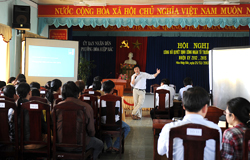
[Photo 1] Habitat Programme Manager, Dr Nguyen Quang introduces the aims of the consultation with the urban poor in Hoa Hiep Bac Ward, Lien Chieu District, Danang. "We came here to listen to you, to understand what you want, what you need and how we can help to make the lives of urban poor better, and we can attain sustainable urban development" Quang said.
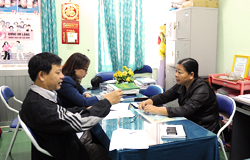
[Photo 2] UN staff interviewing an official from Thanh Khe Tay Women's Union about their pro-poor activities. "I want capacity building classes for the Women's Union in the ward to improve our pro-poor knowledge and methodologies. We are sometimes limited in our capacities to help because of the problems facing the poor are so diverse," said Nguyen Thi Le Na, chairwoman of Thanh Khe Tay Women's Union
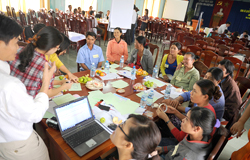
[Photo 3] Group discussion in Danang: Facilitator is encouraging people to share their life stories.
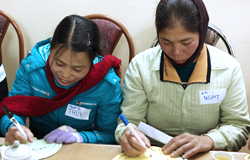
[Photo 4] Migrant women in Phuc Tan ward painting their dreams
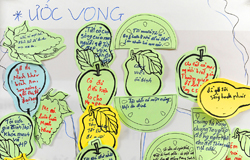
[Photo 5] Group discussion results – The dreams of the urban poor are not impossible, they are based on simple needs such as jobs for themselves and their family members, adequate housing, official tenancy rights, access to basic services and financial resources, micro-capital to run their own business, education for their children, and a health insurance.
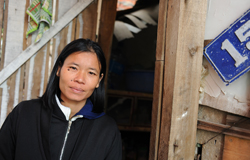
[Photo 6] "I want a proper house so the six people in my family don't have to sleep in a 9 square meter room," said 34 year old Vu Thi Thanh Hoa in Phuc Tan Ward.
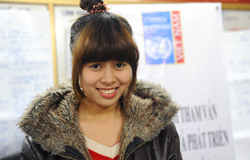
[Photo 7] "I want to continue my uncompleted studies,'' 20 year old Vu Thi Phuong, who migrated from Hung Yen province to live in Phuc Tan Ward said.
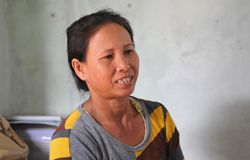
[Photo 8] "I want to escape poverty, but I don't dare borrow money because I'm not able to repay it. I just want to have six pigs, 20 chickens and 10 ducks to breed. If I had work, I could invest in my daughter's studies, and she'll have a job. I don't want my daughter to follow my path", 48 year old Huynh Thi Loi in Hoa Hiep Bac said.
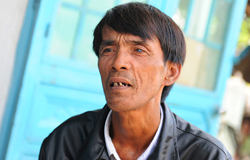
[Photo 9] "I want the government to erase my old debts then I could borrow money to buy more goods for me and my wife to expand the shop at home," said Pham Dung from Hoa Hiep Bac Ward.
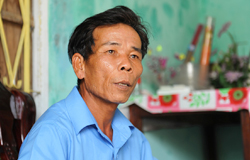
[Photo 10] "I wish I was able to celebrate the weddings for my five children," 48 year old Pham Dung in Hoa Hiep Bac Ward said.
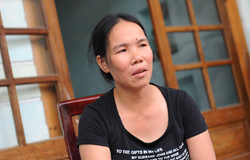
[Photo 11] "I want to buy a computer for my children to help in their studies. And I want my husband to have a stable job," said 35 year old Nguyen Ut Hong in Thanh Khe Tay ward.
- Urban Leadership and Innovation Mini-Ba
- Viet Nam plans launch of City Prosperity Index
- Regional Planning and Linkages for Southern Key Economic Zone Workshop in Ho Chi Minh City
- Policy Dialogue on Right to Adequate Housing: Roles of Urban Communities in the Housing Process
- Training on Developing result based Monitoring and Evaluation System in Urban Sector
- Urban Planning for City Leaders
- Initiatives to Promote Local Economic Development
- The World We Want: Listening to the views of poor and marginalized people 2
- The World We Want: Listening to the views of poor and marginalized people 1
- Leadership Training for Sustainable City Development Strategy of Danang
- New collaboration signed aims to support the Government of Viet Nam in the implementation of the Viet Nam Statistical Development Strategy 2011-2020
- United Nations Resident Coordinator leading UN-Habitat delegation to have courtesy visits to Ho Chi Minh National Academy of Politics and Public Administration and Minister of Construction
- Workshop "Capacity Builging to Develop Climate Change Response towards Green-Growth"
- Quang Nam Green Growth Investment Forum (PDF 475KB)
- Training on Multi Sector Investment Planning
- ‘Local to Global’ Art-Craft Industry Dialogues
- Government of Viet Nam and the United Nations signed new One Plan for 2012-2016
- National Workshop on Project "Urban Observatory System in Vietnam"
- Training of Trainers Workshop on Housing Policy Development
- World Habitat Day in Vietnam
- UN-HABITAT, partners hold consultative leadership workshop for Vietnamese Province *Will open a separate file
- Consultative Leadership Workshop for Quang Nam PDS
- Kick-off workshop of 'Climate Change Vulnerability and Adaptation Assessment (VAA) of Hoi An' project as a initial step of integrated approaches to the development of Hoi An Eco-city
- Workshop on Consultation and Technical Assistance to National Housing Development Strategy toward 2020, vision of 2030
- Vietnamese Study Tour in Korea on Low-Income Housing
- Workshop "Urban Indicators and Urban Management in Vietnam"
- International Conference on "Hanoi Millennium: City Past and Future"
- Joint Hoi An Eco-city Scoping Workshop
- A proactive member of UN family and a trusted partner working together with people for a better urban life - Viet Nam team’s motto to set forth the next HCPD




















